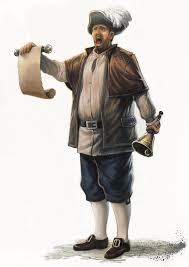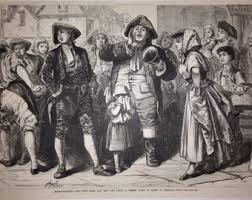
Image via atomhawk
Town Criers: Yesterday and Today
We live in an age of widespread literacy. When we want to know what’s happening in the world around us, we click hyperlinks and sometimes crack open a newspaper. However, for most of human history, the vast majority of people were illiterate—but they had the same desire we do to have the latest information. Gossip and town chatter played a role, but genuine news (as well as propaganda, sales, and everything else we still have today) from its source needed to be spread far and wide quickly.
Hundreds of years ago, thousands of years ago—the news was shouted at you as you walked by, and you could stop to listen and carry the news home to tell your friends and family, or you could keep on walking (maybe muttering falsum nuntium, “fake news!”)
The first ‘town criers’ were Spartan runners from the ancient Grecian empire. With news of battles, wins and losses on their lips, sometimes carrying spoken offers of peace or temporary ceasefires, runners were given information to deliver verbally. This concept of news delivery spread across Europe. Town Criers became a deeply important fixture in society.
“Don’t shoot the messenger” is little more than a cliché saying nowadays. Not too long ago, it was law. Any foul play visited upon a messenger was considered to have been done to the King, and was therefore treason. These men were valuable and held a relatively rare skillset: they could read and write. Even today, any crier who works in the British Commonwealth is be left alone under threat of charge of treason. Perhaps surprisingly, town criers still exist.
 Image via pinterest.com
Image via pinterest.com
In medieval England, the information shared by town crier began to expand greatly. New laws, royal decrees, advertisements for entertainment, plays and shops, and the times and places of bazaars and market days were called out in town. Criers began announcing the betrothals and weddings, births and funerals of the people who could afford to have such things announced.
Typically, the crier would call out news, reading aloud from a written document, and then nail the document to the doorpost of a local inn–or somewhere people gathered in large numbers–for the few who could in fact read. This is the long etymological root of why so many modern newspapers are called The Post.
The news of the crier was considered ‘published.’ For instance, in 1681, the English Parliament (and thus the King) declared that there would henceforth citywide exist a fire safety law that tiles would replace thatched roofing. Since it was now a published law, even if only verbally, ignorance of that law would not be excused, and fines could be levied… or worse. Town criers also attended executions, calling out the death warrant and listing the crimes of the condemned, and even helping to cut them down.
Today, the town crier lingers on, throwback from a bygone epoch—but a fun one. On April 23, 2018 the Duchess of Cambridge, Kate Middleton gave birth to a third child, a son who is now fifth in line for the British crown after his grandfather, father, and two elder siblings. Lo and behold, a town crier was on hand to shout the traditional “oyez, oyez, oyez” (French for, effectively, “hear ye”) and announce the royal birth.
One catch: he is not in fact the royal families’ bell-ringing messenger. However, Tony Appleton is genuinely an official town crier… for the town of Romford, in Essex county, UK. There are roughly 200 official town criers left in existence throughout the commonwealth. Says Appleton, when there’s a royal occasion “I just turn up. Sometimes the police ask me to stop ringing my bell. But I’m a flipping town crier!”
Good on you, Lord Appleton. Keep spreading the news!